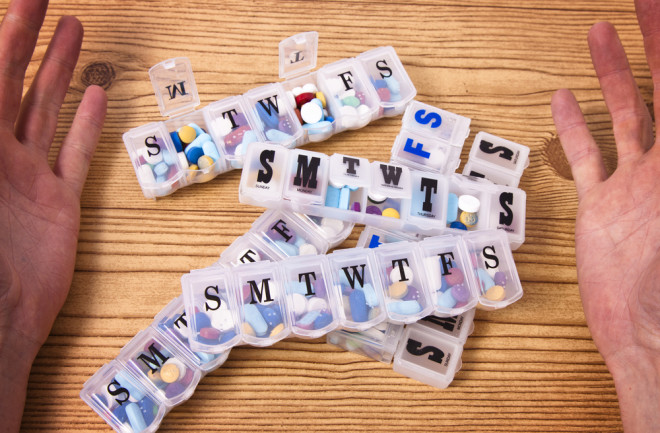Vitamin and mineral supplements can be helpful for people who don’t get enough necessary micronutrients in their diets, says a 2018 position statement by the Academy of Nutrition and Dietetics.
This includes some people with chronic health conditions, people who have problems absorbing nutrients, older people, and pregnant people. And almost three-quarters of Americans take nutritional supplements, according to the Council for Responsible Nutrition, a trade organization representing supplement manufacturers.
How much of that supplement popping is necessary, or even a good idea, is debated, but most of us take some kind of vitamin or mineral supplement at least occasionally, and that’s mostly harmless. However, for some supplements, it’s possible to take too much.
Can Taking Too Many Supplements Be Harmful?
The Academy of Nutrition and Dietetics warns against the “routine and indiscriminate use of micronutrient supplements for the prevention of chronic disease.” Why? Because some nutrients have upper intake levels or upper limits (ULs), beyond which they can be harmful.
Calcium, choline, copper, fluoride, iodine, iron, manganese, molybdenum, nickel, phosphorus, selenium, vitamin B6, vitamin C, vitamin D, B3 (niacin), and zinc are all nutrients that have an established UL. Vitamin A is a special case. It has a UL when it’s in the form of retinol but not when it’s in the form of beta-carotene.
Read More: What Is the Correct Dosage of Vitamin D for Adults?
The problems caused by exceeding these limits can be severe. Too much B6 has been shown to cause nerve damage. Too much B3 (niacin) can cause liver damage. Too much iron can be fatal.
“Extremely high doses of iron (in the hundreds or thousands of milligrams) can cause organ failure, coma, convulsions, and even death,” says Stefan M. Pasiakos, director of the Office of Dietary Supplements at the National Institutes of Health.
Though accidental iron poisoning has occurred mostly in children, it can occur in adults as well. And the damage doesn’t have to be caused by a single dose. Taking large doses of iron over a long period can also be fatal. Even when not deadly, exceeding the UL of a nutrient can be unpleasant. Too much vitamin C can cause nausea, cramps, diarrhea, vomiting, and headaches.
Nutrients that have no upper limit are considered safe at any dose, says Pasiakos.
Read More: Strange Side Effects From Supplements and What You Need to Know
Do I Need To Worry About Fortified Foods?
One thing you don’t have to worry about is building up too much of a nutrient because you took a supplement and then got another dose of the same nutrient in a fortified food, such as cereal. Combining supplements with fortified foods isn’t likely to be a problem as long as you keep your supplements to recommended amounts and consume reasonable amounts of fortified foods, says Pasiakos.
Taking a safe amount of a vitamin or mineral supplement combined with fortified foods could, in some cases, put you above the UL, but this is probably only a concern if you do it regularly, he says.
How to Know Your Limit
The bottom line? If you take supplements, don’t go wild with them. Be sure to take the recommended amount and no more. If you need some specific guidelines on recommended amounts or just want to know more about the scientific research on supplement use, visit the Office of Dietary Supplements website. They have a wealth of fact sheets on specific nutrients, as well as other helpful resources.
And remember, this is about your health. Keep your healthcare team in the loop. Tell your healthcare provider and your pharmacist what medicines and supplements you take and how much of each of them you take each day.
Read More: Dietary Supplements Are No Substitute For a Healthy Lifestyle
This article is not offering medical advice and should be used for informational purposes only.
Article Sources
Our writers at Discovermagazine.com use peer-reviewed studies and high quality sources for our articles, and our editors review for scientific accuracy and editorial standards. Review the sources used below for this article:
Council for Responsible Nutrition. Three-quarters of Americans Take Dietary Supplements; Most Users Agree They are Essential to Maintaining Health, CRN Consumer Survey Finds
Discover Magazine. Do Multivitamins Work and How Do You Know If You Need One?
Academy of Nutrition and Dietetics. Position of the Academy of Nutrition and Dietetics: Micronutrient Supplementation
National Academies Press. Dietary Reference Intakes: Applications in Dietary Assessment (2000)
Stefan M. Pasiakos. Director of the Office of Dietary Supplements at the National Institutes of Health.
Nutrients. The Role of Vitamin B6 in Peripheral Neuropathy: A Systematic Review
Hepatology communications. Niacin‐Induced Anicteric Microvesicular Steatotic Acute Liver Failure
Discover Magazine. Everything You Need to Know About Iron Supplements
National Institutes of Health. Vitamin C Fact Sheet for Consumers
National Institutes of Health. Office of Dietary Supplements
National Institutes of Health. Dietary Supplement Fact Sheets

